
Daffy Duck is a fictional character created by animators Tex Avery and Bob Clampett for Leon Schlesinger Productions. Styled as an anthropomorphic black duck, he has appeared in cartoon series such as Looney Tunes and Merrie Melodies, in which he is usually depicted as a foil for either Bugs Bunny, Porky Pig or Speedy Gonzales. He was one of the first of the new "screwball" characters that emerged in the late 1930s to replace traditional everyman characters who were more popular earlier in the decade, such as Mickey Mouse, Porky Pig, and Popeye.

Porky Pig is an animated character in the Warner Bros. Looney Tunes and Merrie Melodies series of cartoons. He was the first character created by the studio to draw audiences based on his star power, and the animators created many critically acclaimed shorts featuring the character. Even after he was supplanted by later characters, Porky continued to be popular with moviegoers and, more importantly, the Warners directors, who recast him in numerous everyman and sidekick roles.
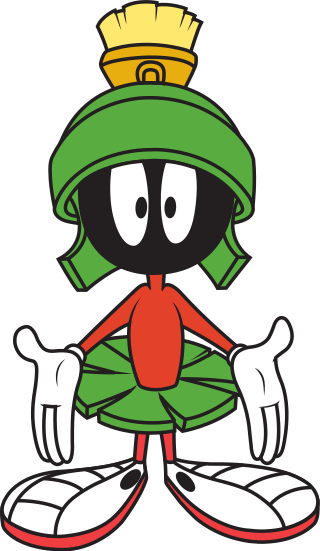
Marvin the Martian is an alien race character from the Looney Tunes and Merrie Melodies series. He frequently appears as a villain in cartoons and video games, and wears a Roman soldier's helmet and skirt. The character has been voiced by Mel Blanc, Joe Alaskey, Bob Bergen and Eric Bauza, among others.

Duck Dodgers is the star of a series of cartoons produced by Warner Bros., featuring Daffy Duck in the role of a science fiction hero.
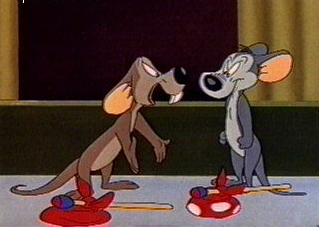
Hubie and Bertie are animated cartoon rodent characters in the Warner Bros. Looney Tunes and Merrie Melodies series of cartoons. Hubie and Bertie represent some of animator Chuck Jones' earliest work that was intended to be funny rather than cute. Seven Hubie and Bertie cartoons were produced between 1943 and 1952.
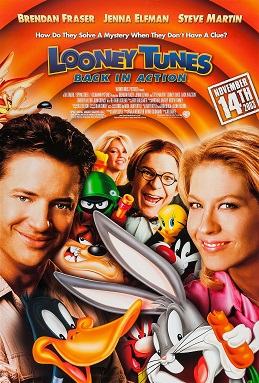
Looney Tunes: Back in Action is a 2003 American live-action/animated comedy film produced by Warner Bros. Feature Animation and distributed by Warner Bros. Pictures. It is the second theatrical feature film in the Looney Tunes franchise, and was directed by Joe Dante from a screenplay by Larry Doyle. Brendan Fraser, Jenna Elfman, and Steve Martin star in the film; Timothy Dalton, Heather Locklear, and Bill Goldberg appear in supporting roles, while Joe Alaskey leads the voice cast. Its plot, which parodies action and spy film conventions, follows Bugs Bunny and Daffy Duck as they become intertwined in a plot by the ACME Chairman (Martin) to transform the world's population into subservient monkeys using the Blue Monkey diamond. They accompany aspiring stuntman DJ Drake (Fraser) and Warner Bros. executive Kate Houghton (Elfman) on their journey to thwart the Chairman's plot, which doubles as a mission to rescue the former's abducted father, Damian (Dalton).
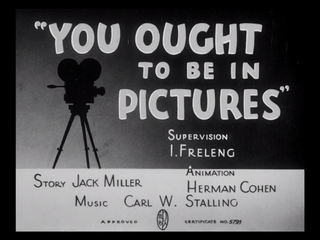
You Ought to Be in Pictures is a 1940 Warner Bros. Looney Tunes short film directed by Friz Freleng. The cartoon was released on May 18, 1940, and stars Porky Pig and Daffy Duck.

Looney Tunes Golden Collection: Volume 1 is a DVD box set that was released by Warner Home Video on October 28, 2003. The first release of the Looney Tunes Golden Collection DVD series, it contains 56 Looney Tunes and Merrie Melodies cartoons and numerous supplements. The set won the Classic Award at the Parents' Choice Awards.
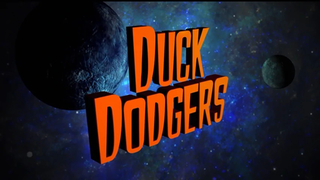
Duck Dodgers is an American animated television series developed by Spike Brandt and Tony Cervone based on the 1953 theatrical animated short film of the same name. Duck Dodgers is a comic science fiction series, featuring the Looney Tunes characters in metafictional roles, with the character Daffy Duck as the title character. It was produced by Warner Bros. Animation from 2003 to 2005. It originally aired on Cartoon Network and later ended on Boomerang.

The Bugs Bunny/Road Runner Movie is a 1979 American animated comedy package film directed by Chuck Jones, consisting of a compilation of classic Looney Tunes/Merrie Melodies shorts and newly animated bridging sequences hosted by Bugs Bunny. The bridging sequences, which had been produced in 1978, show Bugs at his home, which is cantilevered over a carrot-juice waterfall. The film was released to celebrate the 40th anniversary of Bugs Bunny.

Bah, Humduck! A Looney Tunes Christmas is a 2006 animated direct-to-DVD Christmas comedy film starring the Looney Tunes characters, directed by Charles Visser, produced by Warner Bros. Animation and animated overseas by Toon City Animation. The film is based on Charles Dickens' classic novella A Christmas Carol (1843). The special was released on DVD on November 14, 2006, and was then broadcast on Cartoon Network in December 2006. The special was rereleased on DVD as part of the Looney Tunes Holiday Triple Feature on September 1, 2020.
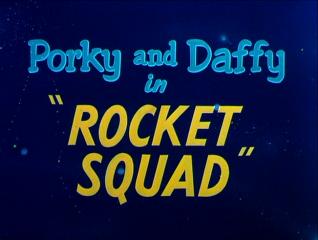
Rocket Squad is a 1956 Warner Bros. Merrie Melodies cartoon directed by Chuck Jones. The short was released on March 10, 1956, and stars Daffy Duck and Porky Pig as futuristic space cops who patrol the Milky Way Galaxy. The police officers of the film are sued for false arrest, and the film ends with their imprisonment.
This is a list of all cartoons featuring Porky Pig. Directors are listed in parentheses.

Duck Dodgers and the Return of the 24½th Century is a 1980 animated short film starring Daffy Duck, Porky Pig and Marvin the Martian. It is the sequel to the 1953 cartoon Duck Dodgers in the 24½th Century. It was the first Daffy and Porky cartoon since 1965. This cartoon first premiered on November 20, 1980, as part of an animated CBS television special called Daffy Duck's Thanks-for-Giving Special, with scenes that would later be cut when this cartoon was reformatted as a short. The final credited work of Michael Maltese, the majority of Maltese's storyboards nonetheless went unused within the finished short. The only parts written by Maltese that remained in the final product is the problem of the lack of the element that produces yo-yo polish and Gossamer being shaven.
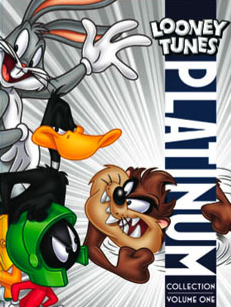
Looney Tunes Platinum Collection: Volume 1 is a Blu-ray Disc and DVD box set by Warner Home Video. It was released on November 15, 2011. It contains 50 Looney Tunes and Merrie Melodies cartoons and numerous supplements. A DVD version of the box set was released on July 3, 2012, but contained no extras.

Looney Tunes: Rabbits Run is a 2015 American animated direct-to-video adventure comedy film in the Looney Tunes franchise produced by Warner Bros. Animation. It is the first new Looney Tunes direct-to-video film since Bah, Humduck! A Looney Tunes Christmas was released nine years prior. The film was made shortly after The Looney Tunes Show, and shares much of the same crew as that series, including director Jeff Siergey, who had also been a supervising animator on Space Jam and lead animator on Looney Tunes: Back in Action. It was released on August 4, 2015, by Warner Home Video, but it was released early on July 7, 2015 on Vudu and Walmart.
Bugs Bunny in Space is a Looney Tunes television special that originally aired on CBS September 6, 1977. Assembled to capitalize on the enormous success of the original Star Wars film in summer 1977, the special is a compilation of clips from science fiction themed Warner Bros. Cartoons, including Duck Dodgers in the 24½th Century.

Chuck Jones: Extremes & Inbetweens – A Life in Animation is a 2000 American television documentary film directed by Margaret Selby. The film chronicles the career of legendary Looney Tunes and Merrie Melodies director, Chuck Jones. The film features interviews with Jones himself, as well as animators Matt Groening, Eric Goldberg, and John Lasseter, critics Roger Ebert and Leonard Maltin, film directors Steven Spielberg, Ron Howard, and Joe Dante, and comedians Whoopi Goldberg, Lorne Michaels, Robin Williams, and June Foray, as well as others. The film was originally broadcast as part of the Great Performances series on November 22, 2000, on PBS, and later released to VHS and DVD by Warner Home Video on October 22, 2002.















